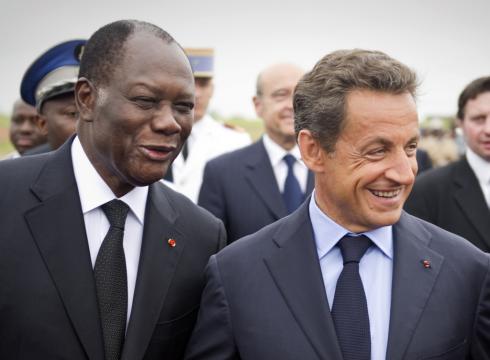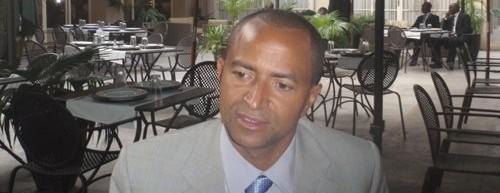Escaping Africa: a new dawn for French policy? – By Richard Dowden

Africa – except as an immigration issue – is unlikely to feature prominently in the forthcoming French Presidential election. But the continent remains a vital part of French politics. From independence Africa was the buttress for France’s claim to be a global leader. French Africa policy was conducted by the presidency. Like a parallel government, teams directly responsible to the president ran foreign, defence, finance and aid ministries for Francophone Africa, separate from the normal government ministries.
From the early days of independence many people said that France had been a more successful decoloniser than Britain because Francophone countries were more stable and prosperous. The fact was that France had never left. Behind every minister’s door would be a French official paid for by France making sure that the minister knew what he was supposed to be doing. And near every presidential palace would be a garrison of French soldiers or legionaires in case a mob (or the country’s own soldiers) decided to cause trouble. The currencies of the former French colonies were linked to and supported by the French franc and then the Euro. French companies treated Africa’s resources as their own and French presidents could summon votes at the UN with a simple phone call.
This non decolonisation policy worked well for France in the 1970s and 80s and countries like Cote d’Ivoire, Benin and Congo Brazzaville looked far more stable and prosperous than their Anglophone counterparts. But at the heart of the Franco-African deal was corruption. President Giscard d’Estaing accepted diamonds from the “˜Emperor’ of the Central African Empire, Jean Bedel Bokassa. President Mitterrand appointed his son as the link person to Africa. In his office in rue d’Elysee which backs onto the Elysee Palace, Jean-Christophe Mitterrand ran French Africa policy for his father. In the corner of his high-ceilinged room, he had a safe from which he dispensed gifts or stored those brought to him. But in 2000 he was imprisoned for arms dealing and corruption and was in and out of court until the sentence was confirmed in 2006.
When the Cold War ended and there were the beginnings of democracy, France’s hand-picked African presidents were growing old and outrageously corrupt. Suddenly they found themselves forced to allow opposition and hold elections. And in France there was growing unease about the corruption created by the relationship – and the expense of supporting increasingly unstable governments.
In 1994 a brave French magistrate, Eva Joly, investigated Elf Aquitaine – France’s flag-bearing oil company which owned much of the oil in French West Africa. It was found to have a $200 million slush fund for its executives. The company was closed down and merged with Total. In the same year Rwanda exploded and Paris went on supporting the Habyarimana regime with military supplies long after the genocide was clear for all to see. Not long afterwards Cote d’Ivoire, the jewel in the crown, began to fall apart in bloodshed. The Franco-African relationship became a byword for murderous dictatorships and sleaze.
What emerged from these scandals was not just how France controlled parts of Africa, but how African presidents controlled French politics, giving money to French political parties and their leaders. When President Nicholas Sarkozy came to power he promised something different but before long it was clear that he too was running a separate chain of command on Africa though an informal advisor, Robert Bourgi, and his secretary, Claude Gueant. Bourgi has admitted to handling money given by African presidents to Jacques Chirac, the former president, Dominique de Villepin and – extraordinarily – the far right racist Jean-Marie le Pen. All deny the allegations, but they revealed that elements of the Africa connection were still very much alive.
In Paris last week I spent time with French officials who were anxious, very anxious, to say how much things had changed and that French Africa policy was now run in an official, professional way and the days of diplomacy through personal links were over. The safe has gone from Jean-Christophe’s office which is now occupied by a professional diplomat.
Interventions in Africa are now only made with a UN Security Council Resolution – such as the mission in Cote d’Ivoire which eventually captured Laurent Gbagbo. As much as possible France wants a European Union African Union agreement on defence through regional frameworks but it is still willing to train African armies through new agreements.
France is also looking for partners all over the continent – not exclusively francophone. And the old commercial links? What about Total and oil? “We support Total when we can but we do not assume that Total’s interests are always French interests” an official told me.
So who will win this battle? The bureaucrats or the politicians? Once the election dust has settled – watch this space.
Meeting Katumba Mwanke
The death of Augustin Katumba Mwanke, “˜advisor’ to President Kabila in Congo, will cause a political earthquake there. Katumba Mwanke was Kabila’s fixer but also decided who got the country’s mining rights and whose concessions were cancelled. He was close to Dan Gertler, an Isreali, who plays the same role in Angola. Mwanke died in a plane crash at Bukavu last week. The circumstances were not thought to be suspicious.
I remember trying to interview him in Lubumbashi when he was governor of Katanga in about 1999. He pointedly kept us waiting for nearly three hours. “˜Us’ was the Financial Times, The Economist and an upmarket Dutch newspaper called NRC Handelsblad. When he finally admitted us we received a lecture on the glories of Laurent Kabila’s reign in Congo and warned us not to take photographs of “naked market women”. As we left we were detained by his bodyguard just for good measure.
Richard Dowden is Director of the Royal African Society.







… [Trackback]…
[…] Read More: africanarguments.org/2012/02/21/escaping-africa-a-new-dawn-for-french-policy-by-richard-dowden/ […]…